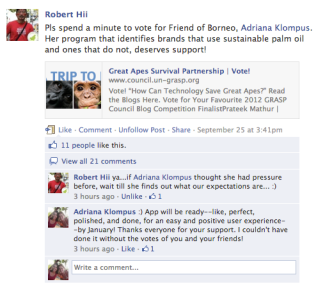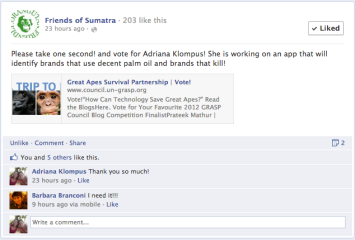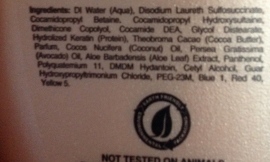Just wanted to post a quick thank-you to everyone who Liked, shared, commented on and voted for my blog post in the Great Apes Survival Partnership – UN Environmental Programme (GRASP-UNEP) Blog Competition!
I came in with 2,033 votes and truly, every vote counted! Thank you so much. It was really wonderfully affirming to find that people like my idea and think this app will make a difference.
A very special thank-you goes out to all the organizations and individuals who asked their followers to vote for me. The “viral” effect was huge in this competition, and since the voting was so close in the end, I can honestly say that everyone who voted for me because an organization they followed on Facebook or Twitter asked them to do so, helped tremendously.

You can expect more news on how the app is coming, more news about palm oil and sustainable palm oil, and of course, about the 2nd GRASP Council Meeting, which I will be attending in November. If you’re interested, please Subscribe to my blog.
If you’re interested in current efforts and issues in great ape conservation, you should follow GRASP on Facebook or Twitter. And if you’re interested in orangutans and palm oil specifically, you should also check out the Facebook pages for Friends of Borneo and Friends of Sumatra, and the Twitter and Facebook pages for Orangutan Land Trust, or any of the organizations I link to at right. These organizations use social networking sites to send followers frequent updates on their work and developments in great ape (and especially orangutan) conservation efforts, and a lot of the articles they link to and pictures they post are really interesting and informative.

Finally, the biggest thanks goes to GRASP for holding this blogging competition, and for picking me as a finalist! There were so many great ideas submitted, and this was a wonderful way to get people thinking about the challenges to continued great ape survival and sharing these ideas. I am so thrilled that my project has been so well-received. I think the work you do is so important, and it’s very affirming to know that experts in this field think there is value in the time I have spent working on this app. I’ll see you in Paris!

